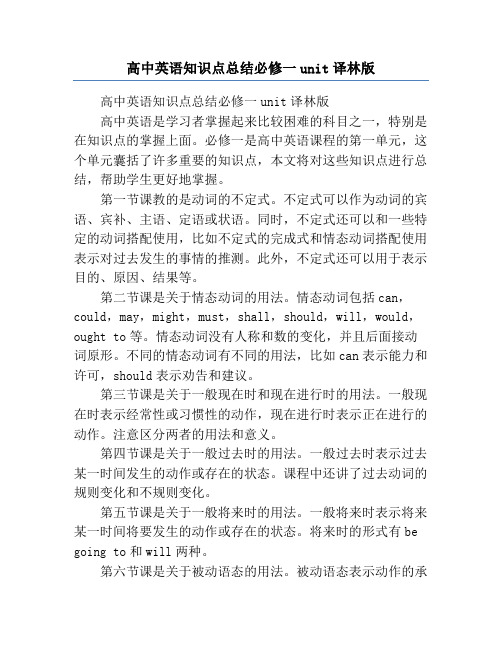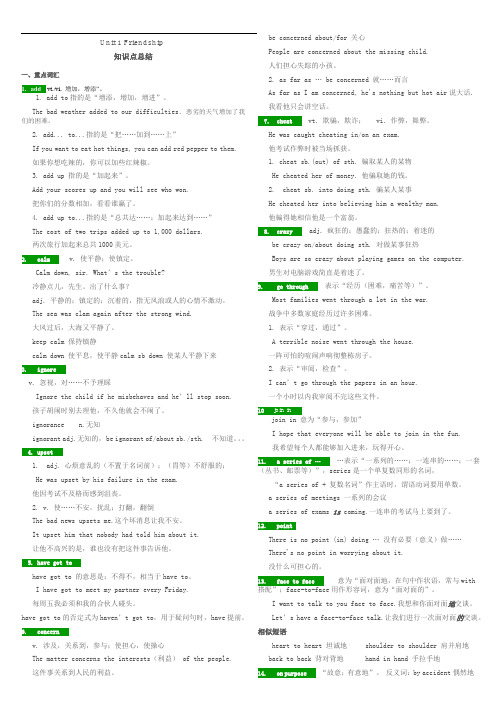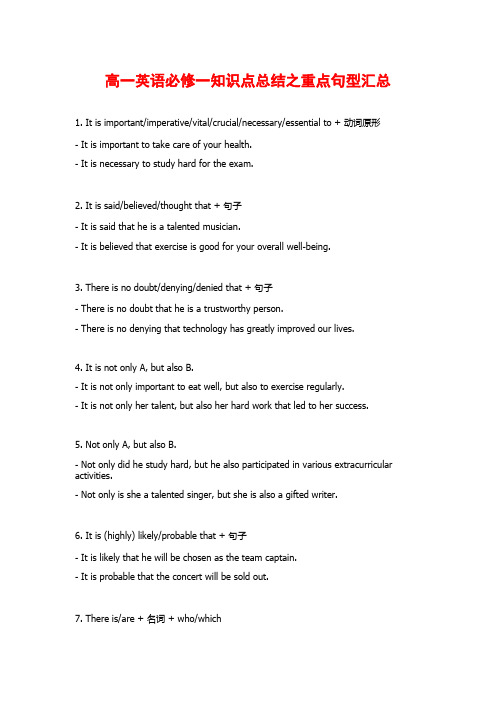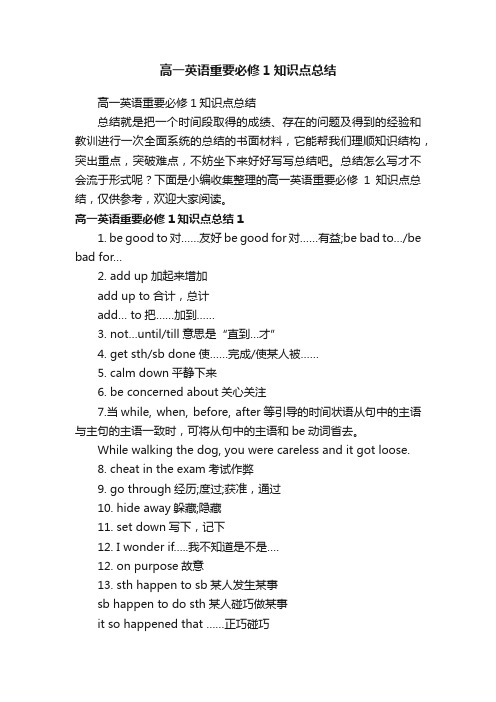高中英语知识点总结必修1重点句型Which kind of transport do you prefer to use- bus or train?
高中英语知识点总结必修一unit译林版

高中英语知识点总结必修一unit译林版高中英语知识点总结必修一unit译林版高中英语是学习者掌握起来比较困难的科目之一,特别是在知识点的掌握上面。
必修一是高中英语课程的第一单元,这个单元囊括了许多重要的知识点,本文将对这些知识点进行总结,帮助学生更好地掌握。
第一节课教的是动词的不定式。
不定式可以作为动词的宾语、宾补、主语、定语或状语。
同时,不定式还可以和一些特定的动词搭配使用,比如不定式的完成式和情态动词搭配使用表示对过去发生的事情的推测。
此外,不定式还可以用于表示目的、原因、结果等。
第二节课是关于情态动词的用法。
情态动词包括can,could,may,might,must,shall,should,will,would,ought to等。
情态动词没有人称和数的变化,并且后面接动词原形。
不同的情态动词有不同的用法,比如can表示能力和许可,should表示劝告和建议。
第三节课是关于一般现在时和现在进行时的用法。
一般现在时表示经常性或习惯性的动作,现在进行时表示正在进行的动作。
注意区分两者的用法和意义。
第四节课是关于一般过去时的用法。
一般过去时表示过去某一时间发生的动作或存在的状态。
课程中还讲了过去动词的规则变化和不规则变化。
第五节课是关于一般将来时的用法。
一般将来时表示将来某一时间将要发生的动作或存在的状态。
将来时的形式有be going to和will两种。
第六节课是关于被动语态的用法。
被动语态表示动作的承受者放在句子主语的位置,而动作的执行者放在句子的谓语位置。
被动语态的构成为be + 过去分词。
第七节课是关于名词性从句的用法。
名词性从句可以作主语、宾语、表语或同位语。
名词性从句的引导词有连词that,wh-引导的词(如what,who,which,when等)和whether。
第八节课是关于定语从句的用法。
定语从句修饰某一名词或代词,并且放在名词或代词之后。
常见的关系词有who,whom,which,that和whose等。
高中英语必修一第三单元重点、难点

高中英语必修一第三单元重点、难点Unit Three Travel journal1、Which kind of transport do you prefer to use, bus or train?你更喜欢那种交通工具,汽车还是火车?prefer 更喜欢用法归纳:(1)+名词.---Which do you prefer, tea or coffee? 你更喜欢什么, 茶还是咖啡?--- I prefer tea. 我更喜欢茶。
(2)+ 不定式Our daughter prefers to stay at home today. 我们女儿今天喜欢呆在家里。
(3)+动名词Many people prefer swimming in summer. 许多人夏天喜欢游泳。
特别提示:prefer to do表示某一次的动作;prefer doing表示经常性的习惯动作。
(4)prefer sb. to do sth. 更喜欢某人做某事We prefer you to tell us the truth. 我们更喜欢你给我们说实话。
(5)prefer that从句My wife prefers that I come home on time every day. 我妻子更喜欢我每天按时回家。
(6)prefer A to B 比起B来更喜欢A / 喜欢A胜过喜欢BMost students prefer Chinese to English. 比起英语来,大部分同学更喜欢汉语。
特别提示:在prefer A to B句型中,A和B既可以是名词,也可以是动名词。
并且考查动名词的几率更大。
(7)prefer to do rather than do 宁愿做某事而不愿做某事I prefer to stay at home rather than go out. 今天我宁愿呆在家里也不愿出去。
特别提示:1、考查prefer to do rather than do时,常常会把rather than do放在句首,无论放在什么位置,只要同学们记住了这个句型,就不难选出答案。
必修一unit 3单元

Prefer sb to do 宁愿某人做某事
Prefer Prefer
A to B doing
st与h tBo相d比oi,ng更s喜th欢宁A愿做某事而不愿意做某事
Prefer to do sth rather than do sth. 宁愿做某事,而不愿做某事
I prefer to work /working in the mountain area. I’d prefer you to drive, if you don’t mind. She prefers jazz to rock music. I would prefer reading books to watching TV.
expense : 常指实际支付的费用总数 额,有时也指钱的花费。 I can't afford the expense of redecorating my house. 我负担不起 重新装修房子的费用。
Flow Look at the map on page 18 and list the countries that the Mekong River flows through. 看第18 页上的地图并列出湄公河流经的国家。
bit late, so could you save me a place?
近来交通拥挤,我可能会到得晚一点儿,你能给我留个位 子么?
2.Prefer Prefer ut.(preferred, preferred ; preferring)更喜欢,喜 欢
Prefer to do sth/ doing sth.更喜欢做某事。
例:I have known him ever since he was a child. 他从小我就 认识他了。 这种用法同since 差不多,不过 ever since 比 since 用得少。 再如:We have lived in Shanghai ever since we came to China.( 自从我们来到中国之后就住在上海
人教高一英语必修一Unit-1知识点总结带例句

Unit 1 Friendship知识点总结一、重点词汇1. vt./vi. 增加,增添”。
1. add to指的是“增添,增加,增进”。
The bad weather added to our difficulties.恶劣的天气增加了我们的困难。
2. add... to...指的是“把……加到……上”If you want to eat hot things, you can add red pepper to them.如果你想吃辣的,你可以加些红辣椒。
3. add up 指的是“加起来”。
Add your scores up and you will see who won.把你们的分数相加,看看谁赢了。
4. add up to...指的是“总共达……;加起来达到……”The cost of two trips added up to 1,000 dollars.两次旅行加起来总共1000美元。
2. v. 使平静;使镇定。
Calm down, sir. What’s the tr ouble?冷静点儿,先生。
出了什么事?adj. 平静的;镇定的;沉着的,指无风浪或人的心情不激动。
The sea was clam again after the strong wind.大风过后,大海又平静了。
keep calm 保持镇静calm down 使平息,使平静calm sb down 使某人平静下来3.v. 忽视,对……不予理睬Ignore the child if he misbehaves and he’ll stop soon.孩子胡闹时别去理他,不久他就会不闹了。
ignorance n.无知ignorant adj.无知的, be ignorant of/about sb./sth. 不知道。
1. adj. 心烦意乱的(不置于名词前);(胃等)不舒服的;He was upset by his failure in the exam.他因考试不及格而感到沮丧。
高一英语必修一知识点总结之重点句型汇总

高一英语必修一知识点总结之重点句型汇总1. It is important/imperative/vital/crucial/necessary/essential to + 动词原形- It is important to take care of your health.- It is necessary to study hard for the exam.2. It is said/believed/thought that + 句子- It is said that he is a talented musician.- It is believed that exercise is good for your overall well-being.3. There is no doubt/denying/denied that + 句子- There is no doubt that he is a trustworthy person.- There is no denying that technology has greatly improved our lives.4. It is not only A, but also B.- It is not only important to eat well, but also to exercise regularly.- It is not only her talent, but also her hard work that led to her success.5. Not only A, but also B.- Not only did he study hard, but he also participated in various extracurricular activities.- Not only is she a talented singer, but she is also a gifted writer.6. It is (highly) likely/probable that + 句子- It is likely that he will be chosen as the team captain.- It is probable that the concert will be sold out.7. There is/are + 名词 + who/which- There are many students who want to join the school club.- There is a doctor who specializes in treating rare diseases.8. The more A, the more B.- The more you practice, the better you will become.- The more you study, the higher your grades will be.9. It is not until + 过去时 + that + 句子- It is not until he saw the doctor that he realized how serious his illness was.- It was not until I read the book that I understood the underlying message.10. It is + 形容词 + that + 句子- It is interesting that she chose to study abroad.- It is impressive that he managed to finish the project ahead of schedule.这些句型在高一英语必修一的学习中经常会用到,掌握这些句型可以帮助你更好地表达自己的观点和思路。
高一英语重要必修1知识点总结

高一英语重要必修1知识点总结高一英语重要必修1知识点总结总结就是把一个时间段取得的成绩、存在的问题及得到的经验和教训进行一次全面系统的总结的书面材料,它能帮我们理顺知识结构,突出重点,突破难点,不妨坐下来好好写写总结吧。
总结怎么写才不会流于形式呢?下面是小编收集整理的高一英语重要必修1知识点总结,仅供参考,欢迎大家阅读。
高一英语重要必修1知识点总结11. be good to对……友好be good for对……有益;be bad to…/be bad for…2. add up加起来增加add up to合计,总计add… to把……加到……3. not…until/till意思是“直到…才”4. get sth/sb done使……完成/使某人被……5. calm down平静下来6. be concerned about关心关注7.当while, when, before, after等引导的时间状语从句中的主语与主句的主语一致时,可将从句中的主语和be动词省去。
While walking the dog, you were careless and it got loose.8. cheat in the exam考试作弊9. go through经历;度过;获准,通过10. hide away躲藏;隐藏11. set down写下,记下12. I wonder if…..我不知道是不是….12. on purpose故意13. sth happen to sb某人发生某事sb happen to do sth某人碰巧做某事it so happened that ……正巧碰巧14. It is the first (second…) that… (从句谓语动词用现在完成时)15. in one’s power处于……的控制之中16. It’s no pleasure doing….做…..没有乐趣It’s no good/ use doing sth.做某事是没好处/没用的17. She found it difficult to settle and calm down in the hiding place. it做形式宾语18. suffer from患…病;遭受19. so…that… /such…thay…20. get tired of….对…感到劳累疲惫21. have some trouble with sb/sth.在……上遇到了麻烦22. get along with sb/sth.与某人相处23. ask(sb)for advice. (向某人)征求建议24. make后接复合宾语,宾语补足语须用不带to的不定式、形容词、过去分词、名词等。
必修一unit_1重点句型

必修一unit_1重点句型
一,直接引语连接句
1. 他说:"我会等你。
"
2. 她问道:“你怎么可以保证呢?”
3. 他回答道:“因为我承诺了。
”
4. 苏珊对我说:“这个计划要是你现在就实施好,就可能会有好处了。
”
5. 汤姆询问:“有什么可以表示你给我的支持吗?”
6. 吉姆答道:“当然有!我会一直支持你,不管出现什么情况。
”
二,一般疑问句
1. 你认为应该怎么做?
2. 你如何理解这件事?
3. 你什么时候想开始工作?
4. 你觉得这个计划如何实施?
5. 你觉得我的计划行得通吗?
6. 你希望成功吗?
三,特殊疑问句
1. 什么使你有信心?
4. 为什么你不能努力奋斗?
四,反意疑问句
1. 你不觉得你应该多试试吗?
2. 你就不希望赢得这场比赛了吗?
3. 你不想面对这个问题了吧?
4. 你不想继续努力工作下去吗?
5. 你不认为它还有可能实现吗?
6. 你不认为成功只是困难的挑战吗?。
英语必修一unit1的重点单词短语句型

英语必修一unit1的重点单词短语句型Key Words:1. Acquaintance: A person known to one but usually not a close friend. Example sentence: I met John at a party last night. He seems like a nice acquaintance.2. Ally: A person who cooperates with another in order to achieve a common goal.Example sentence: The two countries formed an alliance to fight against terrorism.3. Companion: A person who accompanies or spends time with another.Example sentence: My dog Charlie is my loyal companion.4. Trustworthy: Able to be relied on as honest or truthful.Example sentence: Sarah is a trustworthy friend. I can always count on her to keep a secret.5. Loyal: Giving or showing unwavering support or allegiance to someone or something.Example sentence: Despite the challenges, John remained loyal to his team till the end.6. Dependable: Able to be trusted or relied on.Example sentence: Tom is a dependable friend. Whenever I need help, he is there for me.7. Respectful: Feeling or showing deference and respect.Example sentence: It is important to be respectful towards your elders.8. Genuine: Truly what something is said to be; authentic.Example sentence: I appreciate people who are genuine and honest.9. Enthusiastic: Having or showing intense and eager enjoyment, interest, or approval.Example sentence: Lucy is always enthusiastic about trying new things.10. Frank: Open, honest, and direct in speech or writing.Example sentence: I appreciate your frankness in telling me the truth.Key Phrases:1. Keep in touch: To maintain regular communication with someone.Example sentence: Even though we live far apart, we try to keep in touch through phone calls and video chats.2. Get along with: To have a friendly and harmonious relationship with someone. Example sentence: Jack gets along well with all his classmates.3. Fall out with: To have a disagreement or argument with someone that leadsto the end of a friendship.Example sentence: Rachel fell out with her best friend after they had a misunderstanding.4. Make up: To reconcile after a disagreement or argument.Example sentence: After their fight, Jane and Maria made up and are friends again.5. Let down: To disappoint or fail to support someone who was relying on you. Example sentence: Mark felt really let down when his friend didn't show up for their planned outing.6. Break up: To end a romantic relationship.Example sentence: After years of dating, Sarah and Mike decided to break up.7. Come across: To meet or find by chance.Example sentence: I came across an old photo of us while cleaning out my closet.8. Hang out: To spend time with someone casually.Example sentence: We like to hang out at the park and play frisbee on the weekends.9. Put up with: To tolerate or endure someone or something unpleasant.Example sentence: It's not easy to put up with my noisy neighbors.10. Look up to: To admire or have great respect for someone.Example sentence: I look up to my older brother because he is very successful.Key Sentence Structures:1. Comparatives and Superlatives: This unit introduces the use of comparativesand superlatives to compare different qualities of people or things.Example sentences:- Mary is taller than her sister.- The Great Wall of China is one of the longest walls in the world.2. Irregular Verbs: Students will learn and practice using irregular verbs in sentences.Example sentences:- I went to the park yesterday.- He has sung in many concerts.3. Present Continuous Tense: The present continuous tense is used to describe actions happening at the time of speaking or ongoing actions.Example sentences:- We are watching a movie right now.- She is studying for her exams.4. Possessive Pronouns: Students will learn how to use possessive pronouns to indicate ownership.Example sentences:- This book is mine.- These shoes are theirs.5. Conditional Sentences: The unit introduces conditional sentences, which express hypothetical situations and their potential consequences.Example sentences:- If it rains tomorrow, we won't go to the beach.- If I study hard, I will pass the exam.6. Past Continuous Tense: The past continuous tense is used to describe actions that were happening at a specific time in the past or ongoing actions in the past.Example sentences:- I was sleeping when the phone rang.- She was cooking dinner when her friends arrived.7. Modal Verbs: Students will learn and practice using modal verbs to express possibility, permission, or obligation.Example sentences:- You can borrow my pen if you need it.- We should finish our homework before watching TV.8. Relative Pronouns: Relative pronouns are used to introduce relative clauses, which provide additional information about a noun or pronoun in the sentence. Example sentences:- The woman who is speaking to John is our teacher.- The book that you gave me is very interesting.9. Passive Voice: The passive voice is used when the focus is on the action being done to the subject, rather than the subject doing the action.Example sentences:- The letter was delivered to the wrong address.- The cake was baked by my sister.10. Reported Speech: Reported speech is used to tell someone what another person said, without using the exact words.Example sentences:- He said that he was tired.- She asked if I had finished my homework.。
